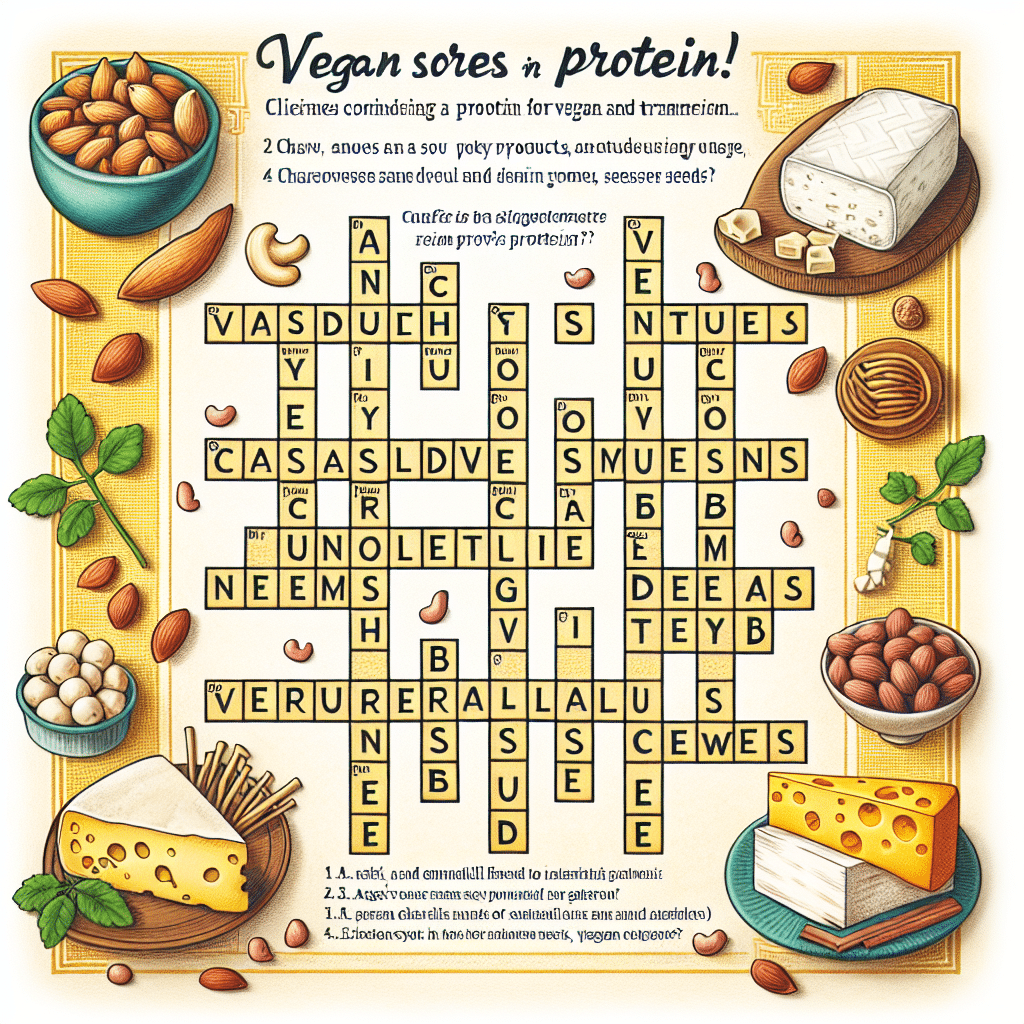Protein Source in Vegan Cheese: Crossword Clues Unveiled
-
Table of Contents
- Vegan Cheese Protein Sources: Unveiling the Nutritional Puzzle
- Understanding Protein in Vegan Cheese
- Common Plant-Based Proteins in Vegan Cheese
- Case Studies and Examples
- Nutritional Benefits of Plant-Based Proteins in Vegan Cheese
- Statistics on Health Outcomes
- Challenges and Innovations in Vegan Cheese Production
- Emerging Trends in Vegan Cheese
- Conclusion: The Future of Vegan Cheese
- Discover ETprotein’s Plant-Based Protein Products
Vegan Cheese Protein Sources: Unveiling the Nutritional Puzzle

The rise of veganism has led to an increased demand for plant-based alternatives to traditional dairy products. Vegan cheese is one such alternative that has gained popularity among those who follow a vegan lifestyle or have dairy intolerances. However, the question of protein content in vegan cheese often arises, as cheese made from cow’s milk is known to be a good source of protein. This article delves into the various protein sources used in vegan cheese, exploring their nutritional benefits and how they contribute to making vegan cheese not just a tasty but also a nutritious option.
Understanding Protein in Vegan Cheese
Protein is an essential macronutrient necessary for the building and repair of tissues, the production of enzymes and hormones, and overall health. For vegans, finding adequate sources of protein can be a challenge, especially when it comes to replacing dairy products. Vegan cheese manufacturers have tackled this issue by using a variety of plant-based proteins to mimic the texture and nutritional profile of traditional cheese.
Common Plant-Based Proteins in Vegan Cheese
- Nut-Based Proteins: Nuts like cashews and almonds are often used in vegan cheese for their creamy texture and high protein content. They are blended and fermented to achieve a cheese-like consistency.
- Soy Protein: Soybeans are a complete protein source, containing all nine essential amino acids. Tofu and soy protein isolates are commonly used in vegan cheese production.
- Pea Protein: Pea protein is another complete protein that is frequently used in vegan cheese. It is derived from yellow split peas and is known for its high digestibility and low allergenic potential.
- Rice Protein: Brown rice protein is often included in vegan cheese formulations for its hypoallergenic properties and mild flavor.
- Seed-Based Proteins: Seeds such as sunflower, pumpkin, and hemp are used for their protein content and nutritional benefits, including essential fatty acids.
Case Studies and Examples
Several vegan cheese brands have successfully incorporated these plant-based proteins into their products. For instance, a popular brand uses a blend of cashew and soy protein to create a meltable vegan cheese that closely resembles the texture of mozzarella. Another brand utilizes pea protein to produce a range of flavored vegan cheese slices that are not only rich in protein but also fortified with vitamins and minerals.
Nutritional Benefits of Plant-Based Proteins in Vegan Cheese
Plant-based proteins offer a range of health benefits that make them an excellent choice for inclusion in vegan cheese. They are generally lower in saturated fats and cholesterol compared to animal proteins, which can contribute to better heart health. Additionally, they often contain fiber and a variety of vitamins and minerals that are beneficial for overall well-being.
Statistics on Health Outcomes
Research has shown that diets high in plant-based proteins are associated with a lower risk of several chronic diseases, including heart disease, type 2 diabetes, and certain types of cancer. A study published in the Journal of the American Heart Association found that replacing animal protein with plant protein was linked to a lower risk of coronary heart disease.
Challenges and Innovations in Vegan Cheese Production
While the inclusion of plant-based proteins in vegan cheese offers many benefits, there are also challenges that manufacturers face. One of the main issues is achieving the same taste and texture as dairy cheese. Innovations in food technology have led to the development of new methods to improve the sensory qualities of vegan cheese, such as using fermentation and aging processes similar to those used in traditional cheesemaking.
Emerging Trends in Vegan Cheese
The vegan cheese market is rapidly evolving, with new products being introduced that cater to the diverse tastes and nutritional needs of consumers. Some of the latest trends include the use of unique protein sources like chickpea protein and the incorporation of superfoods like spirulina for added health benefits. There is also a growing interest in artisanal vegan cheeses that use traditional aging techniques to develop complex flavors.
Conclusion: The Future of Vegan Cheese
The future of vegan cheese looks promising, with ongoing research and development focused on improving the nutritional profile and sensory experience of these products. As consumers become more health-conscious and environmentally aware, the demand for high-quality vegan cheese is likely to continue to grow. With the variety of plant-based proteins available, vegan cheese can be a delicious and nutritious part of a balanced diet.
Discover ETprotein’s Plant-Based Protein Products
If you’re interested in exploring high-quality plant-based proteins for vegan cheese production or other applications, ETprotein offers a range of products that could meet your needs. Their portfolio includes organic rice protein, clear rice protein, pea protein, and various seed proteins, all characterized by a neutral taste and non-GMO, allergen-free attributes. ETprotein’s expertise in exporting and delivering tailor-made protein powder and nutritional supplements makes them a valuable partner for businesses in the food and beverage industry.
About ETprotein:
ETprotein, a reputable plant protein vegan protein Chinese factory manufacturer and supplier, is renowned for producing, stocking, exporting, and delivering the highest quality organic bulk vegan protein and plant proteins. They include Organic rice protein, clear rice protein, pea protein, clear pea protein, watermelon seed protein, pumpkin seed protein, sunflower seed protein, mung bean protein, peanut protein etc. Their offerings, characterized by a neutral taste, non-GMO, allergen-free attributes, cater to a diverse range of industries. They serve nutraceutical, pharmaceutical, cosmeceutical, veterinary, as well as food and beverage finished product distributors, traders, and manufacturers across Europe, USA, Canada, Australia, Thailand, Japan, Korea, Brazil, and Chile, among others.
ETprotein specialization includes exporting and delivering tailor-made protein powder and finished nutritional supplements. Their extensive product range covers sectors like Food and Beverage, Sports Nutrition, Weight Management, Dietary Supplements, Health and Wellness Products, and Infant Formula, ensuring comprehensive solutions to meet all your protein needs.
As a trusted company by leading global food and beverage brands and Fortune 500 companies, ETprotein reinforces China’s reputation in the global arena. For more information or to sample their products, please contact them and email sales(at)ETprotein.com today.












